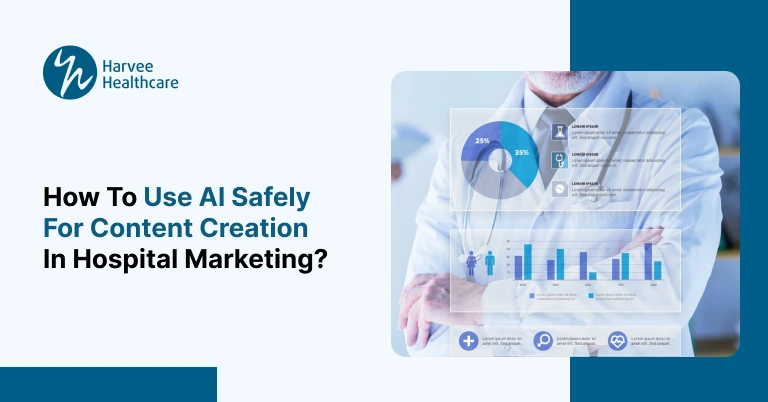
How Can Hospitals Use AI Safely for Content Creation?
Healthcare is one of the many areas that artificial intelligence is transforming. It can enhance patient care and increase the effectiveness of procedures significantly.
But it’s crucial to use AI carefully and ensure it’s used ethically and responsibly.
AI makes it easier for hospitals to create content, like blogs and social media posts, helping them connect with their audience quickly and efficiently. However, there’s a risk involved—mainly the chance of sharing incorrect information.

Source: www.pewresearch.org
This blog will discuss the best AI tools and methods for content creation in hospital marketing, along with essential precautions to ensure safe and effective use.
How can AI be used in Content Creation in Hospital Marketing?
Hospital marketing is more than just promoting healthcare services; it establishes trust, engages with patients, and delivers helpful information. With the development of AI, patient data management, content creation, and other automated processes have become more manageable.
Automated Content Creation:
AI can help create blog posts, social media updates, and email newsletters by studying existing content and developing fresh ideas based on popular topics. This allows us to keep content consistent and up-to-date without starting from scratch every time.
Furthermore, automating content generation saves time on manual activities, freeing up resources for more critical efforts such as patient outreach and community participation.
Content Personalization:
AI tools can adjust content to match the needs of individual patients or specific groups, making it more engaging and relevant.
It also allows for personalization, guaranteeing that patients receive content tailored to their tastes, interests, and medical requirements. By delivering more personalized experiences, hospitals can increase patient loyalty and trust.
Predictive Analytics:
AI can analyze past results and audience behavior to predict which types of content will work best for different groups of people. This helps us focus on strategies most likely to drive engagement and success.
It also ensures effective resource allocation, guaranteeing that resources are focused on content with the most impact.
SEO Optimization:
AI tools can track search trends and suggest keywords with high search volume, making it easier for your content to appear on search engines. Hospitals can improve their online visibility and attract more patients with better optimisation.
It improves user interaction on the website through personalized and relevant content, enhancing engagement and boosting conversion rates.
Generation of Images and Videos:
AI helps to create images, graphics and videos, which helps to improve the educational content on the website.
For example, you can use an AI tool to create an infographic depicting the symptoms of high blood pressure that makes people easily understand the content.
These customized images can increase audience engagement and help them understand complex topics. Employing AI to create clear, visually appealing content can ensure that patients receive helpful, easy-to-understand information, improving patient outcomes and satisfaction.
Effective Strategies for Using AI in Hospital Marketing
There is a famous quote by Ginni Rometty, Former CEO of IBM.
“The greatest benefit of artificial intelligence is its ability to enable humans to do more, be more creative, and achieve higher levels of success.”

Source: www.n-ix.com
Following best practices when using AI for content production in hospital marketing is essential to ensure its safety and effectiveness.
Using Human Oversight to Ensure Quality Control
Including human oversight is the best method to reduce misinformation when utilizing AI in healthcare content. Before being published, medical professionals should always verify AI-generated content for accuracy and reliability.
Using fact-checking techniques is also crucial, particularly for information that discusses treatments or offers medical advice. Additionally, the information should adhere to healthcare ethics to prevent false claims or overstated advantages.
You can be certain that the information is accurate, trustworthy, and complies with the strictest guidelines for healthcare communication when it is subject to human oversight.
Focus on Transparency in AI-Generated Content
Being open and honest is key to maintaining patient trust in healthcare marketing. Hospitals should be transparent about the use of AI when creating content.
For example, they should mark AI-generated content so that patients know.
It’s also critical to acknowledge the limitations of AI because these instruments are inaccurate.
Establishing trust with patients is enhanced by letting them know that humans review the content.
Hospitals should include disclaimers if the content contains medical advice, urging patients to speak with a healthcare provider before making decisions.
Choosing the Right AI Tools for Content Creation
Hospitals must select the right AI technologies for producing healthcare content because they are not all created equal.
For example, Tools like IBM Watson Health are a fantastic option for accurate content because they are specifically made to interact with medical data.
However, using general AI technologies like ChatGPT and others with healthcare-specific filters is vital to prevent inaccurate or misleading information from spreading.
To guarantee that the information is constantly correct and helpful, it’s also critical to choose tools that are updated frequently with the most recent research and link to reliable medical data.
Prioritize the Personalization in Content Creation:
AI specializes in tailoring content to each patient’s preferences and behaviors. Hospitals can use this to tailor educational materials, appointment reminders, and newsletters to specific patient groups.
Personalized material strengthens the bond between the hospital and its patients by making patients feel more involved and connected.
It is also essential to avoid promoting particular medical advice without a complete consultation, even though it can be beneficial to customize content to a patient’s demography or preferences.
Train AI Models Using Relevant Data
For AI to provide helpful and relevant material, it must be trained on current, correct data. Hospitals should concentrate on AI models that employ data unique to healthcare.
This will enhance the content quality and ensure the material is helpful to the patients and audience. To maintain accurate and current information, update the AI frequently with the most recent medical findings.
Teaching AI to comprehend healthcare terminology, language, and ethical standards is critical to prevent errors and produce correct results.
Update AI for Continuous Improvement
Verifying AI-generated information regularly ensures that the model satisfies healthcare requirements. To comply with current healthcare standards, AI systems should be updated with the most recent medical facts and ethical principles.
Since AI is constantly evolving, monitoring it guarantees that hospitals and patients will continue to benefit from it.
Precautions when using AI in Healthcare Marketing:
The healthcare sector is heavily regulated, and distributing false information in marketing can have negative consequences.
Misinformation in the healthcare sector can impact patient safety, trust, and even legal obligations, unlike other businesses where errors might only harm a brand’s reputation.
Patient Privacy:
Regulations such as HIPAA (Health Insurance Portability and Accountability Act) must be adhered to by any AI tool that generates content because hospitals handle sensitive patient data. It’s important to ensure that marketing materials don’t inadvertently contain sensitive patient information.
Partiality in Content:
Hospitals must ensure that the material they create is impartial and doesn’t unintentionally prejudice people based on their social background, gender, or ethnicity.
Ethical Usage:
It is critical to build up AI in a way that stops it from producing deceptive or dangerous content. For example, establish regulations that prevent AI from diagnosing illnesses or recommending treatments without supporting data.
Information Accuracy:
Although AI can extract data from various sources, healthcare data must be fact-based and accurate. Hospitals should review AI-generated content to ensure it doesn’t disseminate inaccurate information that could compromise patient care.
Transparency:
Hospitals should be transparent about the use of AI in their advertising. Patients should understand whether the content they are reading was developed or affected by AI.
Future of AI in Healthcare Marketing
As AI advances, hospitals can provide customized experiences, better communication with patients, and function more efficiently. Hospitals can use AI techniques to analyze patient needs better, anticipate what patients might need, and produce content that matches their interests and preferences.
However, hospitals must, strike a balance between AI use and human control to maintain the information’s accuracy, morality, and patient-centeredness.

Source: www.statista.com
Hospitals must always put accuracy, empathy, and patient trust first when creating content, even when AI can speed up numerous procedures.
Bottom Line:
Healthcare marketers must employ AI to remain competitive and give patients a better experience. By implementing AI, healthcare companies can maintain patient data security, adhere to compliance regulations, and provide high-quality care more effectively.
To use AI safely for content creation for your healthcare company, Harvee Healthcare is your one-stop for the best healthcare digital marketing agency.
Search
Recent Post
Categories
- AI in Healthcare
- Content Marketing
- Dental
- dental Digital Marketing
- Google Ads
- Google my business
- Healthcare marketing
- Healthcare SEO
- Internet Marketing Tips
- Lead Generation
- Local SEO
- Patient Satisfaction
- pay per click
- Pharma Marketing
- Social
- Social Media Marketing
- Traffic
- Website
- Website Designing
Contact
Get in Touch With Us
Coimbatore Address
- 21/1, Periasubbanna Gounder Street, K.K.Pudur, Coimbatore, Tamil Nadu 641038.
- 098942 76263
- info@harveehealthcare.com

Chennai Address
- RMZ Millenia Business Park, Level 6, Phase II, Campus 4B Unit 602A, Kandancavadi, Perungudi, Chennai, Tamil Nadu 600096.
- 098942 76263
- info@harveehealthcare.com

Dubai Address
- Umm Sequeim 3, Jumeirah Rd Opposite Burj Al Arab, Villa #1 855 A Dubai.
- info@harveehealthcare.com

United Kingdom Address
- 3/2 Powderhall Rigg Edinburgh, United Kingdom EH7 4GA.
- info@harveehealthcare.com

Copyrights © 2025 harvee.co.uk










